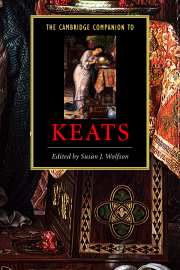Book contents
- Frontmatter
- 1 The politics of Keats’s early poetry
- 2 Endymion’s beautiful dreamers
- 3 Keats and the “Cockney School”
- 4 Lamia, Isabella, and The Eve of St. Agnes
- 5 Hyperion, The Fall of Hyperion, and Keats’s epic ambitions
- 6 Keats and the ode
- 7 Late lyrics
- 8 Keats’s letters
- 9 Keats and language
- 10 Keats’s sources, Keats’s allusions
- 11 Keats and “ekphrasis”
- 12 Keats and English poetry
- 13 Byron reads Keats
- 14 Keats and the complexities of gender
- 15 Keats and Romantic science
- 16 The “story” of Keats
- 17 Bibliography and further reading
- Index
12 - Keats and English poetry
Published online by Cambridge University Press: 28 May 2006
- Frontmatter
- 1 The politics of Keats’s early poetry
- 2 Endymion’s beautiful dreamers
- 3 Keats and the “Cockney School”
- 4 Lamia, Isabella, and The Eve of St. Agnes
- 5 Hyperion, The Fall of Hyperion, and Keats’s epic ambitions
- 6 Keats and the ode
- 7 Late lyrics
- 8 Keats’s letters
- 9 Keats and language
- 10 Keats’s sources, Keats’s allusions
- 11 Keats and “ekphrasis”
- 12 Keats and English poetry
- 13 Byron reads Keats
- 14 Keats and the complexities of gender
- 15 Keats and Romantic science
- 16 The “story” of Keats
- 17 Bibliography and further reading
- Index
Summary
I long to feast upon old Homer as we have upon Shakespeare, and as I have lately upon Milton.
Keats to Reynolds, 27 April 1818Describing himself as “one who passes his life among books and thoughts on books” (KL 1.274), Keats “feasted upon” great poets with extraordinary relish, an appetitive reading he put in terms of delightful eating, drinking, imbibing, and inhaling. His copies of mighty poetic forebears teem with marks and annotations that witness a critical engagement as well as a rapid, enthusiastic absorption of words and thoughts. This poetic “food” (“How many bards”) could provide creative inspiration when Keats craved it most, consolation in times of distress, and themes for his own poetry (On First Looking into Chapman's Homer; On Sitting Down to Read “King Lear” Once Again). The “Remembrance of Chaucer,” he buoyantly affirmed during a lull in the writing of Endymion in May 1817, “will set me forward like a Billiard-Ball” (KL 1.147). Keats often began writing with a ritual of welcoming into his mind “throngs” of elder bards whose “pleasing chime” inspired him (“How many bards”). As he matured, such chimes could be less pleasing, even sometimes a convulsive din, provoking sensations of insuffi- ciency before such creative amplitude or apprehensions of not finding a voice of his own among the throng. “Aye, the count / Of mighty Poets is made up; the scroll / Is folded by the Muses,” laments the narrator of Endymion; “the sun of poesy is set” (2.723-25, 729). Yet for all this seeming finish, the play of predecessor poets in his own voice vitally informed Keats's creative efforts and his sense of poetic identity. He envisioned these interactions as a “greeting of the Spirit” (KL1.243), a partnership in “immortal freemasonry” - as he described actor Edmund Kean's way with Shakespeare (“Mr. Kean”; Cook, 346).
- Type
- Chapter
- Information
- The Cambridge Companion to Keats , pp. 186 - 202Publisher: Cambridge University PressPrint publication year: 2001
- 4
- Cited by



